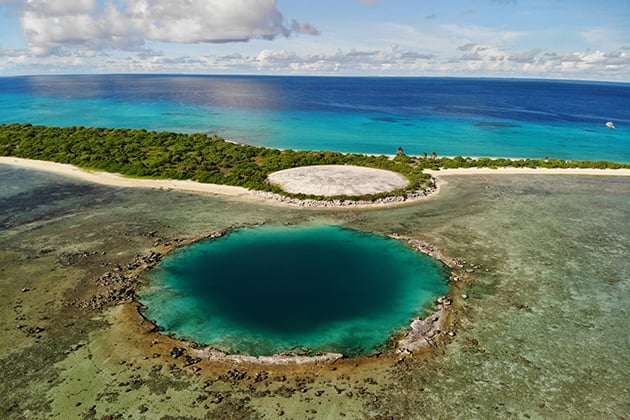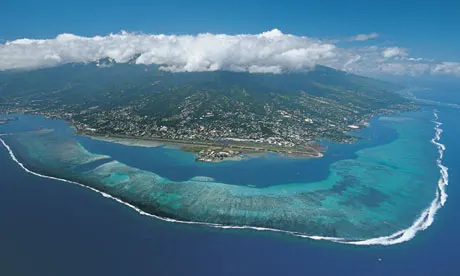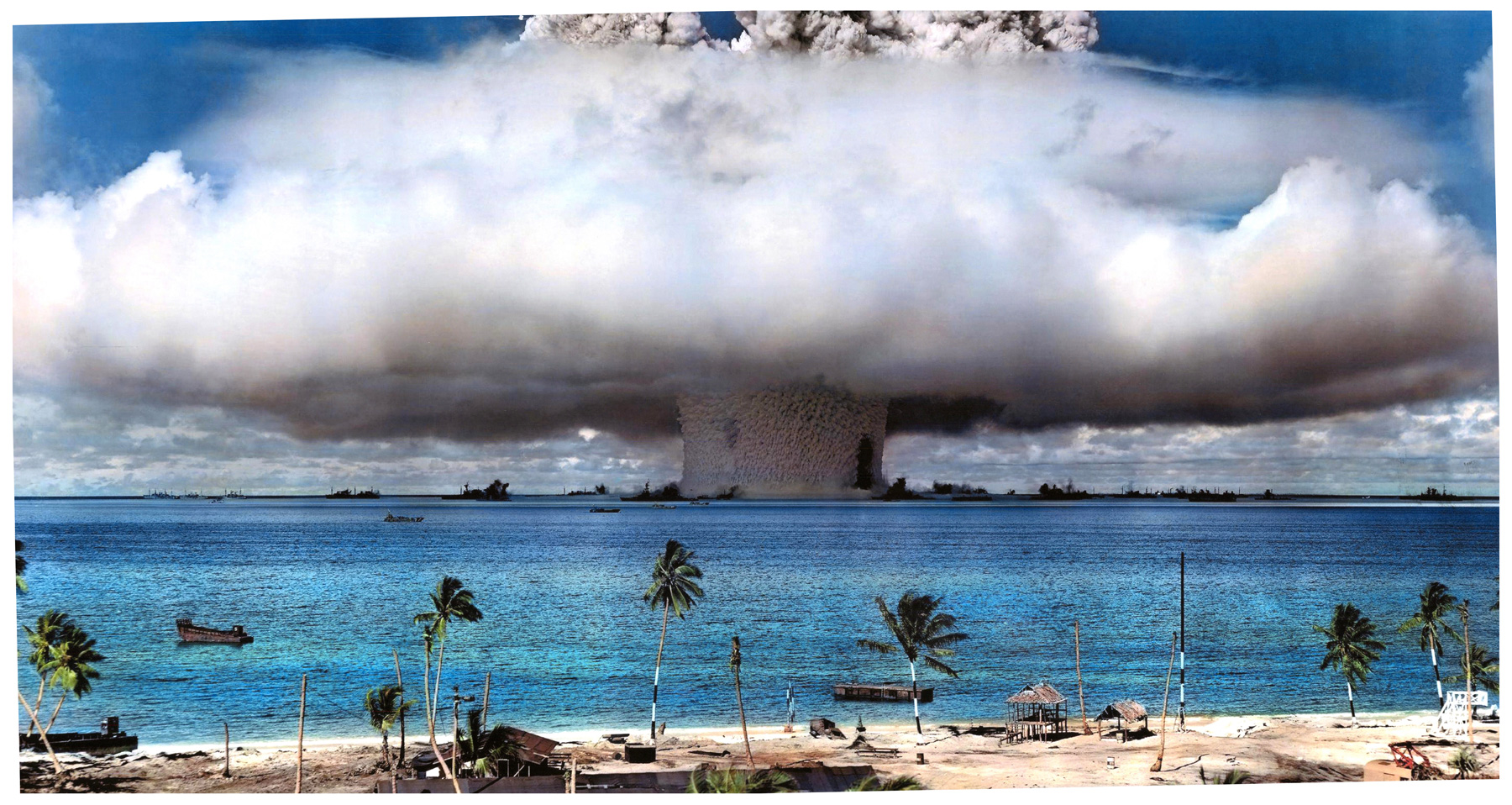
Runit Island, Marshall Islands 14 August 2018
.Carolyn Cole / Los Angeles Times
By Sanjeshni Kumar
12 July 2022
Pacific nuclear victims seek an apology for actions decades ago. “…..we are still angry that we are not recognised as nuclear victims.”
Lest we forget, it has been 24 years since the last nuclear test in Mururoa, French Polynesia and 76 years since the first at the Bikini Atoll in the Marshall Islands. It’s easy to forget that they ever happened unless if you are living with its consequences and paying the price dearly daily.
For Marshall Islands Student Association representative, Danity Laukon, she really did not know the history of the nuclear tests on her country until a few years ago.
They did not teach this history in school and so generations after the 97 nuclear tests didn’t know their own history, a deliberate erasure of a period in history.
But there are daily reminders, such as the lady she met at the airport in Majuro, suffering from thyroid cancer and who cannot be compensated because she was from an atoll that was not one of the four – Bikini, Enewetak, Ronelap and Ulro- identified for compensation.
It was an ‘omission’ to acknowledge that the radioactive fallout downwind as well as the current’s spread the radioactive material.
“Go tell my story, our story, that we are still angry, we are still angry that we are not recognised as nuclear victims,” the lady pleaded with Danity.
Lena Nomand of French Polynesia’s Association 193 says there are inconsistencies in the compensation of nuclear victims and adds that it was important that France also apologizes for her actions decades ago.
“We do need France to ask for forgiveness. “It is not the riches – for us asking for forgiveness is important before the reparation. Two months after President Macron came to French Polynesia, he asked for forgiveness from the people in Algeria. So… just to say that it is possible,” Nomand said.

Tahiti, above, was exposed to 500 times the accepted maximum radiation level from nuclear tests in the 20th century, reports Le Parisien.
Nomand and Laukon were in Vienna last month to attend the first meeting of state parties since the Treaty on the Prohibition of nuclear weapons came into effect in January last year.
Kiribati’s Permanent Representative to the UN, Teburoro Tito urged the international community to listen to the voices of youth and of those whose families have suffered from nuclear testing.
“The international community cannot forget how the former colonial powers treated innocent Pacific Islanders in their pursuit of weapons of mass destruction,” he said. “Nuclear weapons undermine the core tenets of international humanitarian law, and it is unacceptable that a small group of states are spending billions in modernising and maintaining their nuclear arsenals. These weapons are on hair-trigger alert and are ready to annihilate the world. We cannot allow these immoral weapons to continue to threaten humanity.”
The meeting ended with a Declaration by state parties and a 50-point Action Plan., which includes actions on universalization; victim assistance, environmental remediation and international cooperation and assistance; scientific and technical advice in support of implementation; supporting the wider nuclear disarmament and non-proliferation regime; inclusion; and implementation of the treaty’s gender provisions.
“From the adoption earlier today of our rules of procedure to the creation of an intersessional structure and Scientific Advisory Group, to agreement on a comprehensive action plan, you can count on New Zealand as a steadfast supporter and active participant in our Treaty’s future,” New Zealand Minister of Disarmament and Arms Control, Phil Twyford.
“Let us focus now on our immediate tasks and have confidence that the message we will send from our first meeting is one of commitment to – and resolute belief in – the necessary and urgent elimination of nuclear weapons. A message we will carry also to the Review Conference of the Nuclear Non-Proliferation Treaty. Nuclear weapons are never the answer. But our Treaty can be,” Twyford said.

Nuclear testing in the Pacific.
At the Vienna meeting, Pacific Islands Forum chairperson and Fijian Prime Minister, Frank Bainimarama called on world leaders to consider the long-term consequences of the displacement of communities from their traditional lands due to ever-encroaching nuclear waste.
“The terrible legacy of those tests wasn’t only the waste that was created, it was the weapons that were perfected. Thousands of missiles and trillions of dollars later, every person on earth is hostage to arsenals that threaten our existence. It’s time we do away with these trillion-dollar relics and get serious about securing our future,” he said.
Fiji also declared it would work closely with New Zealand to eliminate nuclear weapons, including joint advocacy efforts with partners.
Meanwhile, State parties also declared to “move forward with its (TPNW) implementation, with the aim of further stigmatising and de-legitimising nuclear weapons” and work in partnership with the United Nations, the International Red Cross and Red Crescent Movement, other international and regional organisations, the International Campaign to Abolish Nuclear Weapons and other non-governmental organisations, religious leaders, parliamentarians, academics, indigenous peoples, victims of the use of nuclear weapons (hibakusha), as well as those affected by nuclear testing and youth groups.
They also pledged to “work with affected communities to provide age and gender-sensitive assistance without discrimination to survivors of use or testing of nuclear weapons, and to remediate environmental contamination.”
By Sanjeshni Kumar
12 July 2022
Pacific nuclear victims seek an apology for actions decades ago. “…..we are still angry that we are not recognised as nuclear victims.”
Lest we forget, it has been 24 years since the last nuclear test in Mururoa, French Polynesia and 76 years since the first at the Bikini Atoll in the Marshall Islands. It’s easy to forget that they ever happened unless if you are living with its consequences and paying the price dearly daily.
For Marshall Islands Student Association representative, Danity Laukon, she really did not know the history of the nuclear tests on her country until a few years ago.
They did not teach this history in school and so generations after the 97 nuclear tests didn’t know their own history, a deliberate erasure of a period in history.
But there are daily reminders, such as the lady she met at the airport in Majuro, suffering from thyroid cancer and who cannot be compensated because she was from an atoll that was not one of the four – Bikini, Enewetak, Ronelap and Ulro- identified for compensation.
It was an ‘omission’ to acknowledge that the radioactive fallout downwind as well as the current’s spread the radioactive material.
“Go tell my story, our story, that we are still angry, we are still angry that we are not recognised as nuclear victims,” the lady pleaded with Danity.
Lena Nomand of French Polynesia’s Association 193 says there are inconsistencies in the compensation of nuclear victims and adds that it was important that France also apologizes for her actions decades ago.
“We do need France to ask for forgiveness. “It is not the riches – for us asking for forgiveness is important before the reparation. Two months after President Macron came to French Polynesia, he asked for forgiveness from the people in Algeria. So… just to say that it is possible,” Nomand said.

Tahiti, above, was exposed to 500 times the accepted maximum radiation level from nuclear tests in the 20th century, reports Le Parisien.
Nomand and Laukon were in Vienna last month to attend the first meeting of state parties since the Treaty on the Prohibition of nuclear weapons came into effect in January last year.
Kiribati’s Permanent Representative to the UN, Teburoro Tito urged the international community to listen to the voices of youth and of those whose families have suffered from nuclear testing.
“The international community cannot forget how the former colonial powers treated innocent Pacific Islanders in their pursuit of weapons of mass destruction,” he said. “Nuclear weapons undermine the core tenets of international humanitarian law, and it is unacceptable that a small group of states are spending billions in modernising and maintaining their nuclear arsenals. These weapons are on hair-trigger alert and are ready to annihilate the world. We cannot allow these immoral weapons to continue to threaten humanity.”
The meeting ended with a Declaration by state parties and a 50-point Action Plan., which includes actions on universalization; victim assistance, environmental remediation and international cooperation and assistance; scientific and technical advice in support of implementation; supporting the wider nuclear disarmament and non-proliferation regime; inclusion; and implementation of the treaty’s gender provisions.
“From the adoption earlier today of our rules of procedure to the creation of an intersessional structure and Scientific Advisory Group, to agreement on a comprehensive action plan, you can count on New Zealand as a steadfast supporter and active participant in our Treaty’s future,” New Zealand Minister of Disarmament and Arms Control, Phil Twyford.
“Let us focus now on our immediate tasks and have confidence that the message we will send from our first meeting is one of commitment to – and resolute belief in – the necessary and urgent elimination of nuclear weapons. A message we will carry also to the Review Conference of the Nuclear Non-Proliferation Treaty. Nuclear weapons are never the answer. But our Treaty can be,” Twyford said.

Nuclear testing in the Pacific.
At the Vienna meeting, Pacific Islands Forum chairperson and Fijian Prime Minister, Frank Bainimarama called on world leaders to consider the long-term consequences of the displacement of communities from their traditional lands due to ever-encroaching nuclear waste.
“The terrible legacy of those tests wasn’t only the waste that was created, it was the weapons that were perfected. Thousands of missiles and trillions of dollars later, every person on earth is hostage to arsenals that threaten our existence. It’s time we do away with these trillion-dollar relics and get serious about securing our future,” he said.
Fiji also declared it would work closely with New Zealand to eliminate nuclear weapons, including joint advocacy efforts with partners.
Meanwhile, State parties also declared to “move forward with its (TPNW) implementation, with the aim of further stigmatising and de-legitimising nuclear weapons” and work in partnership with the United Nations, the International Red Cross and Red Crescent Movement, other international and regional organisations, the International Campaign to Abolish Nuclear Weapons and other non-governmental organisations, religious leaders, parliamentarians, academics, indigenous peoples, victims of the use of nuclear weapons (hibakusha), as well as those affected by nuclear testing and youth groups.
They also pledged to “work with affected communities to provide age and gender-sensitive assistance without discrimination to survivors of use or testing of nuclear weapons, and to remediate environmental contamination.”
No comments:
Post a Comment